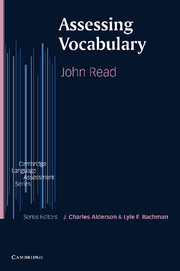Book contents
- Frontmatter
- Contents
- Series editors' preface
- Acknowledgements
- 1 The place of vocabulary in language assessment
- 2 The nature of vocabulary
- 3 Research on vocabulary acquisition and use
- 4 Research on vocabulary assessment
- 5 Vocabulary tests: four case studies
- 6 The design of discrete vocabulary tests
- 7 Comprehensive measures of vocabulary
- 8 Further developments in vocabulary assessment
- References
- Index
1 - The place of vocabulary in language assessment
Published online by Cambridge University Press: 03 May 2010
- Frontmatter
- Contents
- Series editors' preface
- Acknowledgements
- 1 The place of vocabulary in language assessment
- 2 The nature of vocabulary
- 3 Research on vocabulary acquisition and use
- 4 Research on vocabulary assessment
- 5 Vocabulary tests: four case studies
- 6 The design of discrete vocabulary tests
- 7 Comprehensive measures of vocabulary
- 8 Further developments in vocabulary assessment
- References
- Index
Summary
Introduction
At first glance, it may seem that assessing the vocabulary knowledge of second language learners is both necessary and reasonably straightforward. It is necessary in the sense that words are the basic building blocks of language, the units of meaning from which larger structures such as sentences, paragraphs and whole texts are formed. For native speakers, although the most rapid growth occurs in childhood, vocabulary knowledge continues to develop naturally in adult life in response to new experiences, inventions, concepts, social trends and opportunities for learning. For learners, on the other hand, acquisition of vocabulary is typically a more conscious and demanding process. Even at an advanced level, learners are aware of limitations in their knowledge of second language (or L2) words. They experience lexical gaps, that is words they read which they simply do not understand, or concepts that they cannot express as adequately as they could in their first language (or L1). Many learners see second language acquisition as essentially a matter of learning vocabulary, so they devote a great deal of time to memorising lists of L2 words and rely on their bilingual dictionary as a basic communicative resource. Moreover, after a lengthy period of being preoccupied with the development of grammatical competence, language teachers and applied linguistic researchers now generally recognise the importance of vocabulary learning and are exploring ways of promoting it more effectively.
- Type
- Chapter
- Information
- Assessing Vocabulary , pp. 1 - 15Publisher: Cambridge University PressPrint publication year: 2000
- 4
- Cited by



